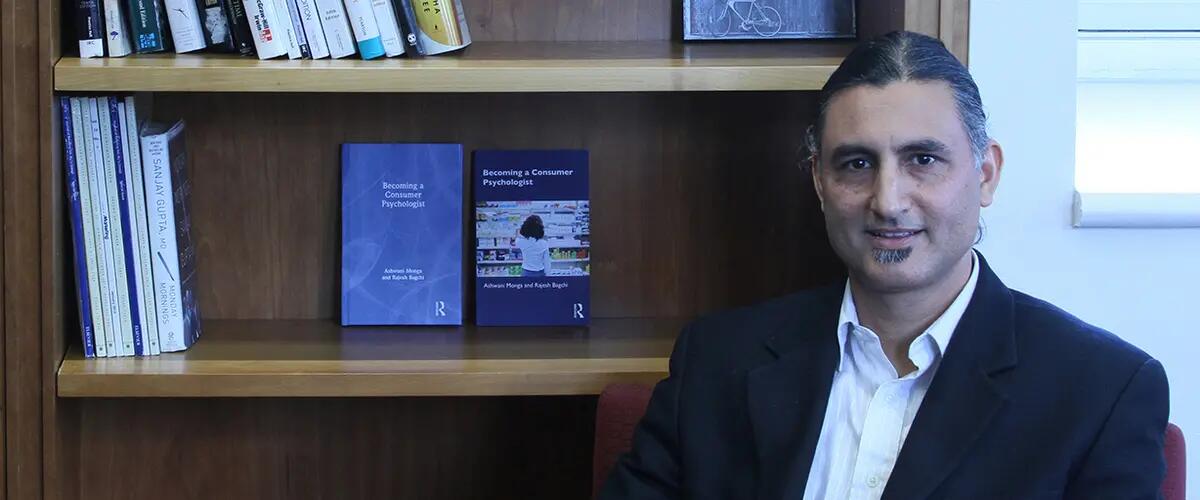
Ashwani Monga, Rutgers University-Newark provost and executive vice chancellor, is a marketing professor at Rutgers Business School.
Professor's first book is a guide to becoming a consumer psychologist
Marketing professor Ashwani Monga, who is currently serving as provost and executive vice chancellor at Rutgers University-Newark, completed his first book Becoming a Consumer Psychologist. It’s a guide for anyone thinking about entering the field of consumer psychology. Monga and his co-author offer insights about different programs that train consumer psychologists, and highlight the various professions where consumer psychology can be applied.
Monga, who began his career at Rutgers as chair of the marketing department at Rutgers Business School, recently answered some questions about writing the book and combining his own expertise with the insight of others.
Q: How did the idea for the book come about?
A: “I have always loved talking with students about careers in consumer psychology. While I knew that there wasn’t an authoritative guide out there, it never occurred to me that I could write one myself. Then this person from Routledge, my publisher, contacted me. She had come across my name on the website of the Society for Consumer Psychology and, after looking up my details, felt that I may be a good person to write this book. She told me how they have a series of “becoming” books (e.g., Becoming a Clinical Psychologist) and would like me to write one on consumer psychology. I immediately knew that I wanted to do this, but I also knew that I didn’t have the bandwidth to do it on my own. Fortunately for me, my dear friend, Rajesh Bagchi, who is the marketing department chair at Virginia Tech, agreed to join me. We have been research collaborators and this partnership turned out to be successful as well.”
Q: Tell us about some of the work that went into it.
A: “It was a lot of work, more than we thought it would be when we started. Our initial thought was that the two of us would just conceptualize a structure and start writing. However, we soon realized that we would be limiting the reader to what we already know. So, we first conducted some research on educational routes that we were less familiar with, such as consumer psychology programs housed outside of business schools. Additionally, we approached 23 other consumer psychologists, some academics like us, and some in areas such as marketing research, advertising, consulting, and social marketing. They shared their insights on consumer psychology that truly enriched the book and helped us provide a much broader perspective for the reader. All of this took considerable time and effort but it was worth it.”
Q: What guidance does it provide to people who are interested in consumer psychology?
A: “We discuss who consumer psychologists are, what they study, and what they do in their diverse roles. As I mentioned earlier, the book also provides valuable insights from 23 other individuals. They share how they became consumer psychologists, their likes and dislikes about the profession, how they see the field evolving, and their advice for those considering a career in this area. A bulk of the book provides guidance on the educational route—what programs to consider, what to study, and how to find appropriate positions. We discuss in detail the route of graduate programs and academic careers. But, thanks to the surveys we conducted, we are also able to share information on alternative educational and work pathways that lead to professions involving consumer psychology.”
Q: Tell us about those different professions.
A: “Consumer psychologist is not a title that people use on their business cards, but (consumer psychology) is an integral component of many professions. There are broadly two main groups. One group is university faculty who generate new knowledge about consumers and then share such knowledge with their students. The other group is of those who apply this knowledge in the marketplace. Think of an advertising manager trying to design a message that appeals to consumers; a marketing research professional trying to uncover consumers’ preferences between different test products; a not-for-profit trying to persuade consumers to recycle; or a public-policy maker trying to design policy that protects the rights of consumers. In all these cases, the goal is to get insights into consumers’ thoughts, feelings, and behavior. Some do misuse these insights, such as when unscrupulous businesses try to cheat their consumers. But these insights are fundamental to making consumers happier, organizations more successful, and societies most prosperous. We hope our readers gravitate toward this nobler side of consumer psychology and help make the world a better place.”
- Susan Todd
Press: For all media inquiries see our Media Kit


